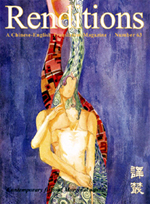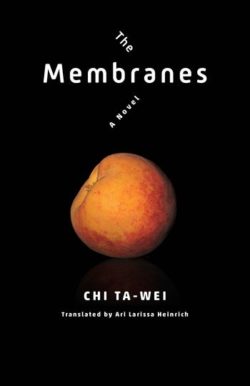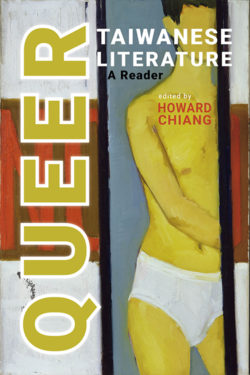June 2021: Chi Ta-wei 紀大偉

Ta-wei Chi is a writer of queer science fiction in Taipei. His 1995 science fiction novel, The Membranes originally published in Chinese as 《膜》and translated into English by Ari Larissa Heinrich (and recently published by Columbia University Press) is also available in Japanese, French and English. His science fiction story collection, The Pearls《珍珠》is also available in French, translated by Gwennaël Gaffric. With a PhD in Comparative Literature at UCLA, he is associate professor of Taiwanese literature at National Chengchi University in Taipei, where he teaches LGBT studies and disability studies. His website can be found here.
 This month we're delighted to be featuring Chi Ta-wei's story 'Umbilicus' 臍, translated by Susan Wilf, and originally published in Renditions no. 63 (Spring 2005). We're very grateful for Renditions and the Research Centre for Translation at the Chinese University of Hong Kong for giving us permission to reprint the story here. Susan's other translations include work by Feng Jicai, Kang Zhengguo, and Jianglin Li. You can read the story here in Chinese, and in English translation here.
This month we're delighted to be featuring Chi Ta-wei's story 'Umbilicus' 臍, translated by Susan Wilf, and originally published in Renditions no. 63 (Spring 2005). We're very grateful for Renditions and the Research Centre for Translation at the Chinese University of Hong Kong for giving us permission to reprint the story here. Susan's other translations include work by Feng Jicai, Kang Zhengguo, and Jianglin Li. You can read the story here in Chinese, and in English translation here.
Emerging from the station, I tightened my collar and headed for the corner, where the glare of the strip club’s gaudy yellow neon lights blotted out all of the stars in the sky. At the doorway, an attractive young man flashed a neatly arranged sheaf of stage photos at me. They all showed scantily clad men—this club didn’t peddle female flesh. But I didn’t need a hard sell. I’d come of my own accord, even though I’d never dreamed of setting foot in such a place before.
You can also read an extract from Chi's novel, The Membranes, translated by Ari Larissa Heinrich, on Words Without Borders.
And a recent episode of the brilliant Translated Chinese Fiction Podcast features an interview with both Chi Ta-wei and Ari Larissa Heinrich.
Here's the blurb from Columbia University Press:
 It is the late twenty-first century, and Momo is the most celebrated dermal care technician in all of T City. Humanity has migrated to domes at the bottom of the sea to escape devastating climate change. The world is dominated by powerful media conglomerates and runs on exploited cyborg labor. Momo prefers to keep to herself, and anyway she’s too busy for other relationships: her clients include some of the city’s best-known media personalities. But after meeting her estranged mother, she begins to explore her true identity, a journey that leads to questioning the bounds of gender, memory, self, and reality.
It is the late twenty-first century, and Momo is the most celebrated dermal care technician in all of T City. Humanity has migrated to domes at the bottom of the sea to escape devastating climate change. The world is dominated by powerful media conglomerates and runs on exploited cyborg labor. Momo prefers to keep to herself, and anyway she’s too busy for other relationships: her clients include some of the city’s best-known media personalities. But after meeting her estranged mother, she begins to explore her true identity, a journey that leads to questioning the bounds of gender, memory, self, and reality.
And our reviewers have been discussing it on our Book Review Network.
'... where Chi truly excels is in going beyond trope mechanisms to deconstruct these normative ideas about reality and embodiment. On the one hand, in this book, gender, sex, sexuality, and attraction are all fluid, evincing a body politics that is refreshingly and unapologetically queer. (Heinrich’s postface is especially helpful in situating The Membrane’s progressiveness within its biographical and political contexts.) On the other hand, the story strips down the notion of ‘the real’ so completely that it gives rise to an ontological horror grounded not so much in our fear for living in unreality, as in an anxiety about losing grasp on any meaningful notion of realness altogether.' - Stella Jiayue Zhu
'The value of speculative fiction usually lies in what it says about its own time, not what it predicts about the future. Despite this, Chi Ta-Wei’s The Membranes, which was first published in 1995 and has been translated by Ari Larissa Heinrich, is a remarkably prescient depiction of a decreasingly habitable planet in which technology is used to spy on others, and queer and trans ideologies have gone mainstream.'- Kevin McGeary
 We're also looking forward to our July Book Club, which will feature the anthology Queer Taiwanese Fiction: A Reader, edited by Howard Chiang and published by Cambria Press. The collection includes stories by Chi Ta-wei and other authors, written between 1975 and 2020, and 'reflects the profusion of gender and sexual configurations that has marked Taiwan’s complex history for the past half century.'
We're also looking forward to our July Book Club, which will feature the anthology Queer Taiwanese Fiction: A Reader, edited by Howard Chiang and published by Cambria Press. The collection includes stories by Chi Ta-wei and other authors, written between 1975 and 2020, and 'reflects the profusion of gender and sexual configurations that has marked Taiwan’s complex history for the past half century.'
